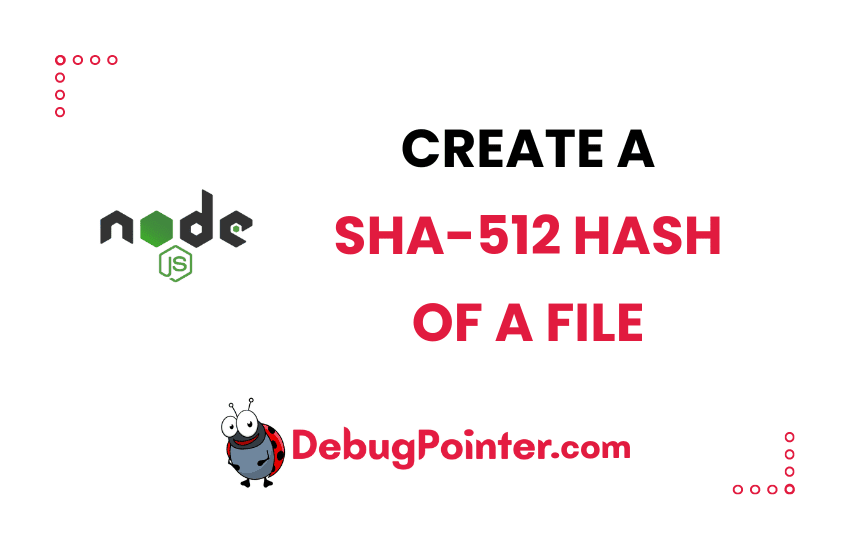As a developer who has extensively worked with Node.js, I am excited to share some valuable insight with you today. I’ll be pulling the curtain back on how to create a SHA-512 hash of a file in Node.js. You might be thinking, “Why do I need to create a hash?” The answer is quite straightforward. Hashing is a fundamental aspect of cybersecurity, providing us with a way to ensure data integrity. Now, buckle up as we delve deep into the technicality of generating a SHA-512 hash in Node.js, a journey that promises to enlighten you on this intriguing topic.
Encryption and hashing have served as the foundation for new security modules, among other network security developments. One of the most used hash algorithms is the Secure Hash Algorithm(SHA) with a digest size of 512 bits, or SHA 512.
The SHA-512 hashing algorithm is currently one of the best and secured hashing algorithms after hashes like MD5 and SHA-1 has been broken down. Due to their complicated nature it is not well accepted and SHA-256 is a general standard, but the industry is slowing moving towards this hashing algorithm.
SHA 256 is a part of the SHA 2 family of algorithms, where SHA stands for Secure Hash Algorithm. It was a joint effort between the NSA and NIST to introduce a successor to the weaker SHA 1 family. SHA2 was published in 2001 and has been effective ever since.
The hash function generates the same output hash for the same input string. This means that, you can use this string to validate files or text or anything when you pass it across the network or even otherwise. SHA-512 can act as a stamp or for checking if the data is valid or not.
SHA-512 hasn’t gained the popularity that SHA-256 is experiencing or even other types of newer hashing algorithms when it comes to real-world use in blockchain. That being said it does have a few non-blockchain applications that are noteworthy.
The 512 in the name SHA-512 refers to the final hash digest value, meaning that regardless of the amount of plaintext or cleartext, the hash value will always be 512 bits.
For example –
| Input String | Output Hash |
|---|---|
| hi | 150a14ed5bea6cc731cf86c41566ac427a8db48ef1b9fd626664b3bfbb99071fa4c922f33dde38719b8c8354e2b7ab9d77e0e67fc12843920a712e73d558e197 |
| debugpointer | 7e2dd654680000d5e27bf67e5a2c440d122da180a7ee4f1dd792a28d17c8a2d34fafa7f9f6e5f837607d41521de42f628e8fa48c0be8a86953d9bc20006ca1fc |
| computer science is amazing! I love it. | d46bc2b8b0e30ee6f2bfe42826a01d550451223e36d8ea73e46f283eeed3514480b16681ebb9ad8d72c7f9247b5711e5f0797578200afe8229abf86b6ade79cd |
If you want to generate SHA-512 checksum in JavaScript i.e., client side (browser), please follow this article – Create SHA-512 Hash in JavaScript
Node.js crypto module provides cryptographic functions to help you secure code and data in Node.js. It includes a set of wrappers for OpenSSL’s hash, HMAC, cipher, decipher, sign, and verify functions.
crypto is built into Node.js, so there is not configuration or custom implementation needed.
For creating SHA-512 hash in nodejs script/code, we shall use the default crypto module that comes packaged with nodejs.
If you looking to create an SHA512 hash of a string, please follow the article where we discuss about this.
Creating SHA-512 Hash of a File
Now let’s learn how to create an SHA-512 hash of a file. File can be any file, a text file, a JSON file, data file etc.,
You can either require the crypto module-
const crypto = require("crypto");or also use the modern import to import the crypto module-
import { createHash } from "crypto";Here, let’s consider a text file for example – hello.txt having content – Welcome to Debugpointer. Let’s read the contents of the file using the fs module and read the file in a synchronous manner.
import { createHash } from "crypto";
const fs = require("fs");
const buff = fs.readFileSync("hello.txt");
const hash = createHash("sha512").update(buff).digest("hex");
console.log(hash);The output of the above script will be an SHA-512 hash when you run the command node index.js in your shell-
2e0cf3b3ec65868637a1a0ef99ad53a14ab6a24bea42c5ef1957d81a39506acd8d0655b868438f45feff9d31376222da87b194874b4a225f9936d300acd6156ePrefer SHA-256 or SHA-512 or other superior cryptographic hash functions for creating a hash for passwords, integrity verification.
It’s as simple as that! You do not need any fancy npm library for creating an SHA-512 hash in Node.js.
I’m glad that you found the content useful. Reflecting on our journey of hashing in Node.js, I must say, it’s been quite the ride. We’ve cracked the code on creating SHA-512 hashes of files in Node.js, and it’s my hope that this newfound knowledge empowers you in your coding pursuits. Whether it’s ensuring data integrity or verifying the consistency of files, the ability to generate SHA-512 hashes is a powerful tool in any Node.js developer’s toolbox. Remember, the world of coding is always evolving, so stay curious, keep learning, and never hesitate to dive into new concepts. Here’s to your continued growth in this vast field of Node.js. Keep on hashing, my friends! Happy Coding.
